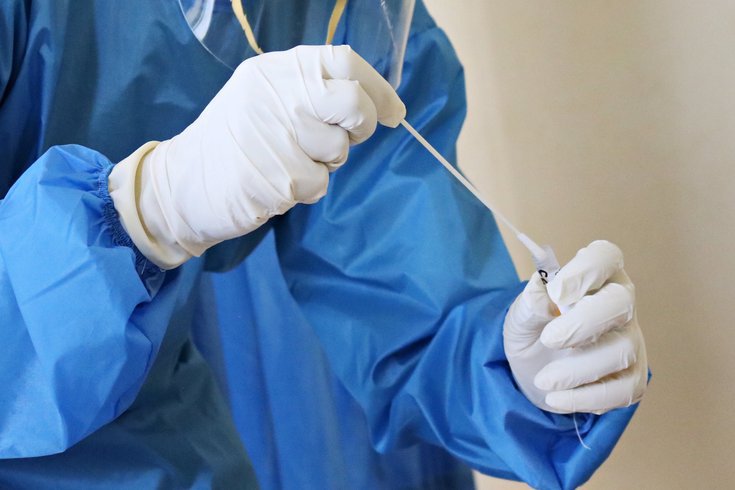
December 25, 2021
 MUFID MAJNUN/UNSPLASH
MUFID MAJNUN/UNSPLASH
The public is discouraged from visiting local emergency departments in Philadelphia to seek COVID-19 testing, which can delay care for others and increase the risk of transmission at hospitals. The omicron variant has created a surge in new coronavirus cases across Philadelphia and the rest of the United States, especially during the holiday season as people gather more.
As demand for COVID-19 testing surges during the holiday season and the omicron variant spreads rapidly across the region, Philadelphia officials are urging people not to go to emergency rooms as a last-ditch effort to get a coronavirus test.
Much of the United States is reeling from a shortage of COVID-19 rapid tests and limited appointment slots available for PCR tests, creating long lines and dwindling supplies at drug stores that have had to restrict purchases of test kits.
As many people seek tests before and after Christmas and New Years, frustration and anxiety are driving some to visit ERs even when they are not experiencing an emergency. The Philadelphia health department and officials from local hospitals are pleading with the public not to do this.
“Our hospital teams are at the ready to provide emergency care for patients with illnesses and injuries of all kinds, but we need the public’s help in safeguarding our resources to provide the right care in the right settings,” said P.J. Brennan, chief medical officer of the University of Pennsylvania Health System. “Anyone experiencing symptoms like shortness of breath or chest pain – which can be symptoms of COVID-19 and many other critical illnesses – should call 911 or seek care in an emergency department, but people in need of testing should seek other sites for care.”
The health department in Philadelphia said Friday that seeking non-emergency COVID-19 testing in an emergency department diverts critical, life-saving resources from people who are truly experiencing an emergency.
“We understand that people want to be safe when they gather with friends and family this Christmas,” said Health Commissioner Dr. Cheryl Bettigole. “And we’ve all seen how difficult it is to find testing throughout the region. But overwhelming the city’s emergency departments just so you can gather for the holiday is dangerous for everyone.”
The health department held a series of test kit giveaways over the past week, distributing thousands of tests before a final event on Friday was canceled due to lack of supply.
Despite the bottleneck in testing, people are encouraged to locate tests through their primary care doctor, an urgent care clinic or a community site.
“Over the last couple of weeks, we have seen dramatic increases in visits to our emergency departments,” said Dr. Sharon Carney, chief clinical officer at Trinity Health Mid-Atlantic. “Many people are presenting for COVID-19 testing that can and should be done at community sites or an urgent care. If you have mild symptoms and suspect COVID-19, contact your primary care physician, or visit an urgent care. We ask our community to please not come to an ED for testing. Visiting an ED without a medical need takes valuable resources away from patients who need us and are critically ill and overwhelms our healthcare workers.“
Finding PCR tests has typically become more difficult during new surges in cases and around the holidays throughout the pandemic. Not only are tests and staff in short supply at these times, but labs have a larger volume of results to process and experience longer delays. The emergence of the omicron variant has exacerbated all of these issues, spreading at a rate that few anticipated would accelerate so quickly.
“What happened was, the omicron virus spread even more rapidly than anybody thought, President Joe Biden said Tuesday. "If I had told you four weeks ago that this would spread via a day-to-day basis, it would spread by 50 or 100%, 200%, 500%, I think you would have looked at me and said, ‘Biden, what are you drinking?’”
Rapid antigen tests and molecular tests, the less reliable but more accessible testing methods, also have seen supplies shrink faster than expected. In part, this has been due to bulk purchasing of these tests by schools and workplaces that hoped to reopen with safeguards in the fall. Resellers have also purchased large quantities of rapid tests, which can be costly even when they are not marked up.
To address the growing need for these tests during the omicron surge, the Biden administrate plans to begin distributing 500 million rapid test kits to the public starting next month. The details of that initiative are still being developed as the White House works on creating a website for the kits to be requested. In the meantime, consumers should expect shortages of rapid tests at drug stores like CVS and Walgreens.
The United States recorded more than 242,000 new cases of COVID-19 on Wednesday, according to data compiled by NBC News. That increased the seven-day average to 167,683, which is higher than the peak of the delta variant in early September.
Cases are expected to rise even higher in the weeks after Christmas and New Years, particularly with limited testing that might otherwise help prevent people from spreading COVID-19 if they are aware they have it.
Despite these concerns, Philadelphia health officials and hospitals maintain that going to an emergency room for this purpose is counterproductive.
"You will put yourself and your loved ones at greater risk and delay necessary care for others," said Dr. Edmund deAzevedo Pribitkin, chief physician executive of Jefferson Health. "We simply will not provide COVID testing for individuals without symptoms due to our limited emergency resources.”